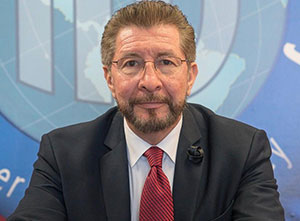The role of international organizations in the creation and permanence of twenty-first century dictatorships in the Americas

By: Carlos Sánchez Berzaín - 23/01/2023
Share:
Governmental and non-governmental international organizations are vital actors in the current world and depending on their objectives they have skills and influence regarding freedom, human rights, democracy, and the economy. Cuban dictatorship’s expansion into Venezuela, Bolivia, and Nicaragua violating all principles and rights and threatening the entire region, urge us to examine the role of international organizations in the creation and permanence of 21st Century Dictatorships in the Americas.
A public international organization or inter-governmental organization is “an association of States, established by an accord amongst its members and equipped with a permanent apparatus comprised by institutions, responsible to pursue the accomplishment of common objectives by means of cooperation amongst them.” By creating an international organization, States relinquish part of their sovereignty according to the organization’s objective and the organization becomes a “a subject of public international law” and acquires competencies and authority within the framework of its constitutive instrument, charter, or treaty.
A private international organization or Non-Governmental Organization (NGO) “is an association comprised by citizens who share a common vision and mission and that is funded by governments, other organizations, persons or private enterprises.” These are not for profit “Civilian society’s organizations” that can accomplish objectives in the international arena as subjects of private rights and “can have an altruistic nature, social objectives, can be a source for political, religious, or other types of interests.”
According to their objectives both; International Organizations as well as Non-Governmental Organizations, have roles in the creation and sustainment of 21st century dictatorships in the Americas, but the Public International Organizations are the ones who have competencies and, therefore, identified rights and responsibilities on the actions and conduct of the States, governments, citizens, and populations of the States, in matters involving human rights, freedom, democracy, and the economy.
The United Nations Organization (U.N.) is the most important intergovernmental organization of the world comprised by 193 member States. It is the direct result of the triumph of democracy over fascist dictatorships in the Second World-War, created with the purpose of “keeping international peace and security, and towards that end: to take effective collective measures to prevent and eliminate threats to peace and suppress attack actions, or other breaches of the peace . . .”
Public International Organizations are political entities because the representation of the States that are part of them are the governments who have their own ideological positions and interests. International officials such as General Secretaries or representatives owe their position to the correlation of forces inside of each of these organizations.
Twenty-First Century Socialism’s dictatorships wield power through “State terrorism” violating human rights and freedom, they persecute, torture, assassinate, they have established themselves as narco-States and commit all types of crime due to the impunity they are able to have through their indefinite permanence in power. These facts have been amply documented and corroborated in the dictatorships from Cuba, Venezuela, Bolivia, and Nicaragua, as well as the transnational organized crime groups these regimes are part of.
The 64 years of Cuba’s dictatorship is the hardest and most tacit indicator of the disregard for international obligations from organizations such as the UN, OAS, TIAR, the International Criminal Court, the Pan American Health Organization, specialized organizations on economics, the Inter American Human Rights Court, the UN Human Rights Commission, the Office of the UN High Commissioner for Human Rights, and more. Millions of exiles, thousands of political prisoners -currently 1,057- tortured, assassinated, slavery and human trafficking are all proof.
Cuba’s satellite dictatorships in Venezuela, Bolivia, and Nicaragua, all with hundreds of political prisoners and millions of exiles, replicate the infamy of the crimes of the Castroist dictatorship that has become Castrochavist. These are the scenarios of failure, non-compliance and dereliction of duties mandated by international organizations who are content with measly declarations that only further consolidates the situation of the “peoples’ helplessness” and the “ample impunity of organized crime that wields the dictatorial power.”
The failure to properly identify the culprit, the enemy, the violator of international peace and security who, shaped as dictatorships and with the discourse of “revolutions”, is solely transnational organized crime with a facade, is up to now part of the catastrophic omissions of the international system, of its general and specialized organizations, of their representatives and officials who -with few notable exceptions- have turned these institutions into nothing more than steady employment with a promising retirement and who with their limited actions and great omissions are indeed part of the creation and sustainment of dictatorships.
*Attorney & Political Scientist. Director of the Interamerican Institute for Democracy.
Translation from Spanish by Edgar L. Terrazas
«The opinions published herein are the sole responsibility of its author».